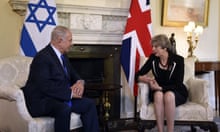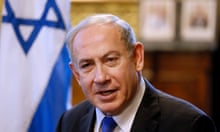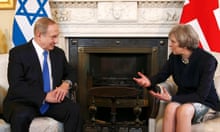The shadow foreign secretary, Emily Thornberry, is calling on the UK to mark the centenary of the Balfour declaration – which called for the creation of a Jewish national homeland – with a formal British recognition of the state of Palestine.
The Balfour declaration was issued on 2 November 1917, and took its name from a letter written by Arthur Balfour, the foreign secretary, expressing support for “the establishment in Palestine of a national home for the Jewish people” to Lord Rothschild.
Although Israel was not established until three decades later, the declaration is still seen, not least by Israel, as a founding diplomatic initiative for a Jewish state. It is deeply resented by Palestinians.
Speaking in the West Bank city of Nablus on Sunday, the Palestinian prime minister, Rami Hamdallah, described the Balfour declaration as a “historical injustice” against the Palestinian people.
The Israeli prime minister, Benjamin Netanyahu, is attending a commemorative dinner in London on Thursday hosted by the current Lords Balfour and Rothschild, where Thornberry will also be a guest.
Thornberry also questioned Israel’s commitment to a two-state solution – a Palestinian state alongside Israel – suggesting that the emergence of single binational state, with fewer rights for Palestinians, would pose a risk to Israel’s democracy.
In pointed comments that underlined the heated debate over how the anniversary of the Balfour declaration should be publicly noted, Thornberry added that it should be marked but not necessarily celebrated.
“I don’t think we celebrate the Balfour declaration,” Thornberry told the website Middle East Eye in a wide-ranging interview on UK foreign policy. “But I think we have to mark it because it was a turning point in the history of that area and the most important way of marking it is to recognise Palestine.
“The British government have said they will do, it’s just a question of when the time is right and it seems to me this is the time,” Thornberry added.
Acknowledging that Balfour’s letter had been a “turning point in history”, she continued that the test today was whether two viable states – Palestine and Israel – could emerge from the process.
Thornberry added that she was concerned that Israel had “lost its way” and was heading for a “one-state reality”, incorporating Palestinian areas now occupied by Israel.
That, she added, would be “letting down the Israeli people because you cannot have a democratic, Jewish one state in that area. So they will have to choose.”
Thornberry’s comments follow remarks by Israel’s ambassador to the UK, Mark Regev, who denounced those who oppose the Balfour declaration as “extremists”.
“Those who oppose the Balfour declaration are exposing themselves for the extremists they are,” Regev told a meeting of the Board of Deputies of British Jews.
Explaining his comment, Regev added that the Balfour declaration was “not about the final borders of peace between Israel and its neighbours, it’s not about the future of the settlements, it’s not about the final state of Jerusalem in peace … [Our opponents’] position is to deny our people’s right to national self-determination and that is an unjust position.”
Thornberry’s remarks contrast with those of the foreign secretary, Boris Johnson, who celebrated the Balfour declaration in an article published at the weekend.
He added that the declaration’s stipulation that “... nothing shall be done which may prejudice the civil and religious rights of existing non-Jewish communities in Palestine” had “not been fully realised”.
Controversy has surrounded the appropriate way to mark the anniversary of the Balfour declaration. Senior Palestinian political figures have campaigned for years for an apology from Britain for promising a future Jewish state in British Mandate Palestine in 1917.
Thornberry will be standing in for Jeremy Corbyn, the Labour leader, at Thursday’s celebration dinner. Corbyn has said he cannot attend because of pre-existing engagements, which has been read as a snub by some in Israel and in the British Jewish community.










